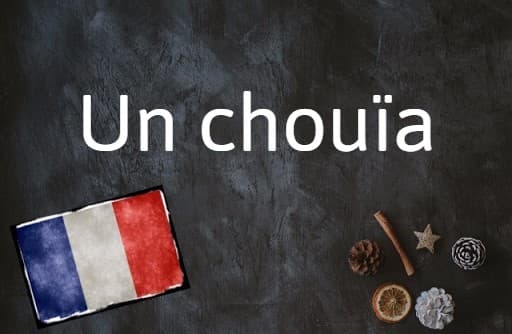French phrase of the day: Un chouïa

This word is easy to understand, but pronouncing it is a different matter.
Why do I need to know un chouïa?
Because it’s fun to pronounce, and the locals will be very impressed if you manage to pull it off.
What does it mean?
You may be familiar with the term in one of its many other forms – un chouia, un chouilla, un chouya – but the meaning is the same. It’s a very informal way of saying “a little”.
If there is no agreed-upon spelling, that’s because it’s derived from the Arabic word šuya, meaning “a little”, which exists in North African dialects, and also because to this day you’re more likely to use it in conversation than to write it down.
Just like “a little (bit)”, un chouïa can be used in pretty much any context or grammatical structure.
If someone asks how much milk you want in your coffee, you could reply, Un chouïa – just a smidgen. Or, you can use it alongside a noun, to ask for un chouïa de lait – a tiny bit of milk.
But the term can also be combined with an adjective, as in, Tu peux mettre la télé un chouïa plus forte, s’il te plait ? – Could you turn the TV up a little bit, please?
Like other words in French which use the ouill sound (bouilloire, anyone?), it can be daunting to try to pronounce. But if you can master chouïa, the others will follow. To help you say it, imagine it was written Shoo-ya. If you really want to master the pronunciation, you can separate it out even more – shoo-y-a – but when said quickly it becomes two syllables.
Use it like this
La sauce manque un chouïa de sel – The source is missing a little bit of salt
Je voudrais que le plafond soit un chouïa plus clair que les murs – I would like the ceiling to be a touch lighter than the walls
Tu ne trouves pas cette chanson un chouïa répétitive ? – Don’t you find this song a tiny bit repetitive?
Synonyms
Un petit peu – a little bit
Un poil – a tad
Un tantinet – a smidgen
Comments
See Also
Why do I need to know un chouïa?
Because it’s fun to pronounce, and the locals will be very impressed if you manage to pull it off.
What does it mean?
You may be familiar with the term in one of its many other forms – un chouia, un chouilla, un chouya – but the meaning is the same. It’s a very informal way of saying “a little”.
If there is no agreed-upon spelling, that’s because it’s derived from the Arabic word šuya, meaning “a little”, which exists in North African dialects, and also because to this day you’re more likely to use it in conversation than to write it down.
Just like “a little (bit)”, un chouïa can be used in pretty much any context or grammatical structure.
If someone asks how much milk you want in your coffee, you could reply, Un chouïa – just a smidgen. Or, you can use it alongside a noun, to ask for un chouïa de lait – a tiny bit of milk.
But the term can also be combined with an adjective, as in, Tu peux mettre la télé un chouïa plus forte, s’il te plait ? – Could you turn the TV up a little bit, please?
Like other words in French which use the ouill sound (bouilloire, anyone?), it can be daunting to try to pronounce. But if you can master chouïa, the others will follow. To help you say it, imagine it was written Shoo-ya. If you really want to master the pronunciation, you can separate it out even more – shoo-y-a – but when said quickly it becomes two syllables.
Use it like this
La sauce manque un chouïa de sel – The source is missing a little bit of salt
Je voudrais que le plafond soit un chouïa plus clair que les murs – I would like the ceiling to be a touch lighter than the walls
Tu ne trouves pas cette chanson un chouïa répétitive ? – Don’t you find this song a tiny bit repetitive?
Synonyms
Un petit peu – a little bit
Un poil – a tad
Un tantinet – a smidgen
Join the conversation in our comments section below. Share your own views and experience and if you have a question or suggestion for our journalists then email us at [email protected].
Please keep comments civil, constructive and on topic – and make sure to read our terms of use before getting involved.
Please log in here to leave a comment.